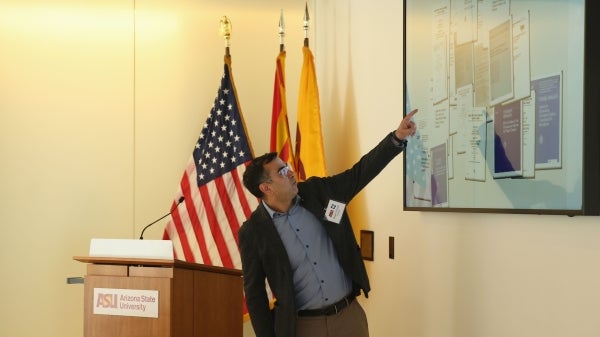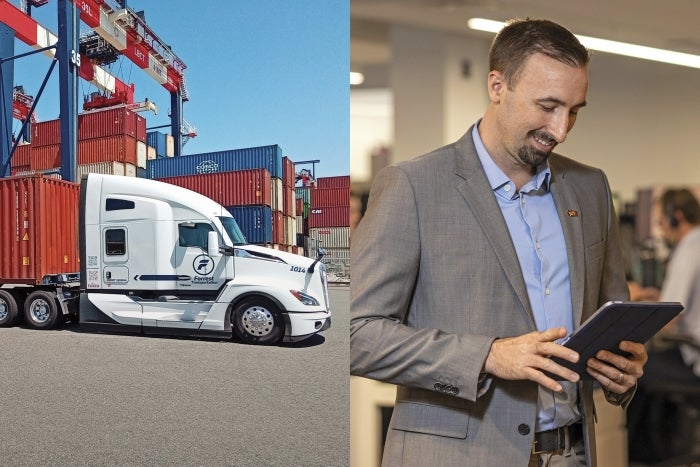Editor's note: This story was featured in the summer 2025 issue of ASU Thrive.
By Sara Clemence
Outdated laptops. Handheld ticket printers. Decommissioned servers. Each year, businesses discard a vast amount of unwanted technology. An Arizona company run by two ASU alums has grown annual revenues to over $32 million a year helping businesses sunset old technology while protecting critical data.
Take the major airline that wanted to dispose of seatback screens. DMD Systems Recovery wiped the tablets and sold them to be used for taking restaurant orders.
It’s just one example of the homegrown innovation that fills the ranks of the Sun Devil 100. This elite group of entrepreneurs and corporate leaders spans a wide array of industries, from marketing to biotech to banking to construction and more.
The companies on the 2025 Sun Devil 100 list employ 256,862 people full time.
The organizations in this year’s group collectively reported a total revenue of $70.7 billion for the 2023 fiscal year, a figure audited by an outside accounting firm. Large multinational firms CBRE and BMO are included in that revenue number. Looking at the other companies on the list, they have delivered a notable economic value of over $17 billion in revenue in fiscal year 2023.
Together, they’re part of what has turned the Phoenix metro area into an economic powerhouse over the last three decades and drawn iconic corporations like Apple and Taiwan Semiconductor Manufacturing Company to make multibillion-dollar investments here.
“There are so many industries that are blooming here in large part because we have that foundational infrastructure — physical and people,” says Chris Camacho, president and CEO of the Greater Phoenix Economic Council. “And as much success as we’ve had in recruiting companies, 80% of the jobs (in an economy) come from the local base.”
Data masters
DMD Systems Recovery has been around for nearly three decades — but its real transformation began in 2020. Aaron Zeper, ’95 BS in finance, took over as CEO in 2020. He saw big potential in what was then a tiny company in the waste management industry. He began designing services for large companies, handling decommissioned electronics not as throwaways, but as assets.
DMD’s process ensures that data is deleted securely — including from the many unexpected devices, like printers, that have hard drives — and in accordance with the relevant tangle of compliance laws.
Bryan White, ’97 BA in communication, a third-generation alum, is the company’s chief operating officer. The company now employs 100 people and recently acquired another business in Palo Alto, California.
“We’re just down the road from ASU’s main campus,” White says, “which makes it easy for us to connect with talented students and recent grads who are excited to get started in the tech world.”
DMD’s rapid growth has earned it a recurring spot on the Inc. 5000 list of the fastest-growing companies in the U.S. It has also been recognized as a Top Workplace in Arizona. But to Zeper, its inclusion in the MO 100 — an award that celebrates leaders of certified B corporations who are creating prosperity not just for themselves, but all stakeholders — is the most motivating.
“The view of it to me is if you provide well-paying jobs, treat your employees well and you continue to grow, then that creates other opportunities for the economy,” he says. “We have a responsibility to keep scaling.”
Building Arizona’s infrastructure
360X Staffing, founded by Eric Ganz, ’03 BA in communication, is a leading Arizona-based construction staffing firm generating over $50 million in annual revenue — and strengthening local economies across the state.
With more than 750 skilled employees — over 300 based in Arizona — 360X partners with major contractors on high-impact projects, including the TSMC semiconductor facility in Phoenix and the VAI Resort in Glendale. When commercial and industrial teams need qualified tradespeople to meet tight deadlines, they turn to 360X.
“Whether clients need support for two weeks or two years, they rely on us for flexible, high-quality staffing — without the long-term burden of hiring and layoffs,” Ganz says.
What began as a construction referral two decades ago has grown into a national operation with deep local roots. Today, 360X specializes in 12 core trades across the commercial, marine, renewables and industrial sectors.
“By focusing on a narrow set of trades, we’ve become true experts,” Ganz says. “That lets us place workers who don’t just meet technical requirements — they thrive across job sites, from wastewater plants and Amazon centers to mines and power plants.”
360X also creates meaningful flexibility for skilled professionals, empowering them to choose jobs based on location, pay and schedule. Many earn a full year’s salary in just nine or 10 months, giving them the freedom to take time off or spend more time with family.
At the core of 360X’s growth is its investment in innovation. Proprietary recruitment software and AI-powered automation help the company source and place candidates faster and more effectively than competitors — a strategic advantage.
“Every time we staff a large project — especially in places like Flagstaff — the benefits ripple far beyond the job site,” Ganz says.
“We’re bringing business to hotels, restaurants and local service providers. It supports the whole community.”
Laser focus on strategy
A car accident changed Bob Maguire’s career trajectory. On the last day of his executive MBA program at ASU, Maguire, ’13 MBA, had a rollover accident on the Loop 202. Amazingly, he walked away without a scratch.
“I remember thinking to myself, ‘Am I really doing everything I can to help people?’” he says. “And the answer was, ‘No.’”
In 2018, Maguire founded BioLab Sciences, known today as BioLab Holdings. Previously, Maguire had founded a regenerative medicine company and brought in Jaime Leija, ’14 MBA, whom he met in the W. P. Carey School of Business executive MBA program, to help start BioLab after Maguire moved on from the previous company.
BioLab makes wound care membranes to help wounds heal after outpatient surgeries. They can’t take credit for the science behind it — the product is a commodity these days — yet BioLab has been on a rocket ship trajectory. In just seven years, the company has grown to 100 employees and increased revenue by more than 689% since 2022.
Before BioLab, Maguire and Leija both had long careers as executives almost entirely outside of the medical industry.
“That was our strength, that we were naive, that we didn’t know,” Maguire says. “I can’t tell you how many naysayers said, ‘You can’t do this. You don’t know what you’re doing. You’re not a PhD or MD.’ You’re right, but we’ll hire them.”
BioLab lets wholesalers sell their product and compensates them based on performance. They also handle all of the regulatory and billing complexities, so medical centers don’t have to.
“I think the key to our growth is that we’ve been laser-focused,” Leija says.
Transporting our everyday products
You may not recognize the name Forrest Logistics — but chances are, something you own has passed through its network. From clothing to electronics, the freight company helps move everyday products from ports and rail yards to their final destinations.
Today, Forrest Logistics generates $85 million a year and employs 95 people — all while helping small independent truckers grow from owning one or two trucks to managing full fleets.
But the company had modest beginnings. Forrest Logistics President Vince Fasso, ’10 BS in global business, co-founded the company out of a guest house and funds from his and his business partner’s 401(k)s.
“We bought used desks and computers, and grew everything organically — never took on any debt,” Fasso says. “That mindset of being frugal and financially sound definitely came from what was taught at ASU.”
The company started as a freight brokerage, hiring trucking companies to pick up containers from ports across the country to deliver to their customers. It later expanded to become a trucking company in its own right.
Today it works with many of the top 10 retailers in the U.S., providing flexible capacity solutions in the most complex sector of America’s supply chain. The technology they have adopted optimizes efficiencies and allows their team to focus on safety and quality of service. In five and a half years of operation, Fasso says, they’ve had zero insurance claims.
“Our job is to move freight safely, cost-effectively and in a way that works for everyone involved,” Fasso says.
Building businesses
Small Giants is another local enterprise that is helping an ecosystem of businesses flourish. After earning her undergraduate degree, founder Danielle Feroleto, ’94 BA in journalism and ’98 MMC in mass communication, took a job at trade magazines, doing everything from writing to selling ads to visiting the printer, and fell in love with the architecture and construction companies they covered.
“They’re hardworking, they’re humble, they are changing the face of our community every day,” Feroleto says.
They also didn’t know how to build their brands, so in 2006, she founded Small Giants as a full-service marketing firm to serve the commercial real estate and construction industries. The company, which is led by an executive team of seven who have all built their names in the industry, employs 45 people.
It leverages AI to innovate, enhance and complement such services as writing press releases and managing marketing analytics. An in-house animation team helps customers present their visions for multimillion-dollar projects.
Recently, their most powerful shift wasn’t based on technology. Feroleto says the team heard from clients that their firms desperately needed more employee training options in soft skills, leadership and other proficiencies to grow and scale. So Small Giants created a full curriculum of trainings, called the Academy for Construction Excellence, to provide another level of support to its clients.
Feroleto says the agency has served more than 400 general contractors, subcontractors and developers.
“Probably 80% of those are in the state of Arizona,” she says. “So we’ve very directly helped companies grow their own companies, which feeds back into the local economy, which I’m super proud of.”
Major impact
“Sun Devil 100 celebrates exceptional ASU alumni who embody entrepreneurial spirit and uphold the values of the ASU Charter,” says Christine K. Wilkinson, president and CEO of the ASU Alumni Association. “These business leaders are achieving excellence in their respective fields, representing the very best of ASU’s commitment to innovation, leadership and service.”
About the author
A reporter and former travel editor for The Wall Street Journal, previously Sara Clemence was the news director for Travel + Leisure and deputy business editor for the New York Post.
More Local, national and global affairs

ASU professors reflect on the pope’s connection to sports and humanity
On the surface, sports and religion may not seem like they go hand-in-hand, but they do share some similar qualities.For example, both have devout followers and require significant time commitment.…

Event examines importance of key slice of research funding, what NIH’s indirect cost cap might mean
On Feb. 7, the National Institutes of Health announced a 15% cap on indirect cost rates on university research, a policy change that sent a strong ripple of concern through an already anxious…

ASU's Panchanathan wins prestigious honor in India for scientific contributions
Arizona State University Professor Sethuraman Panchanathan, the former director of the National Science Foundation, has been awarded the Padma Shri, a prestigious civilian honor, in India.India…







